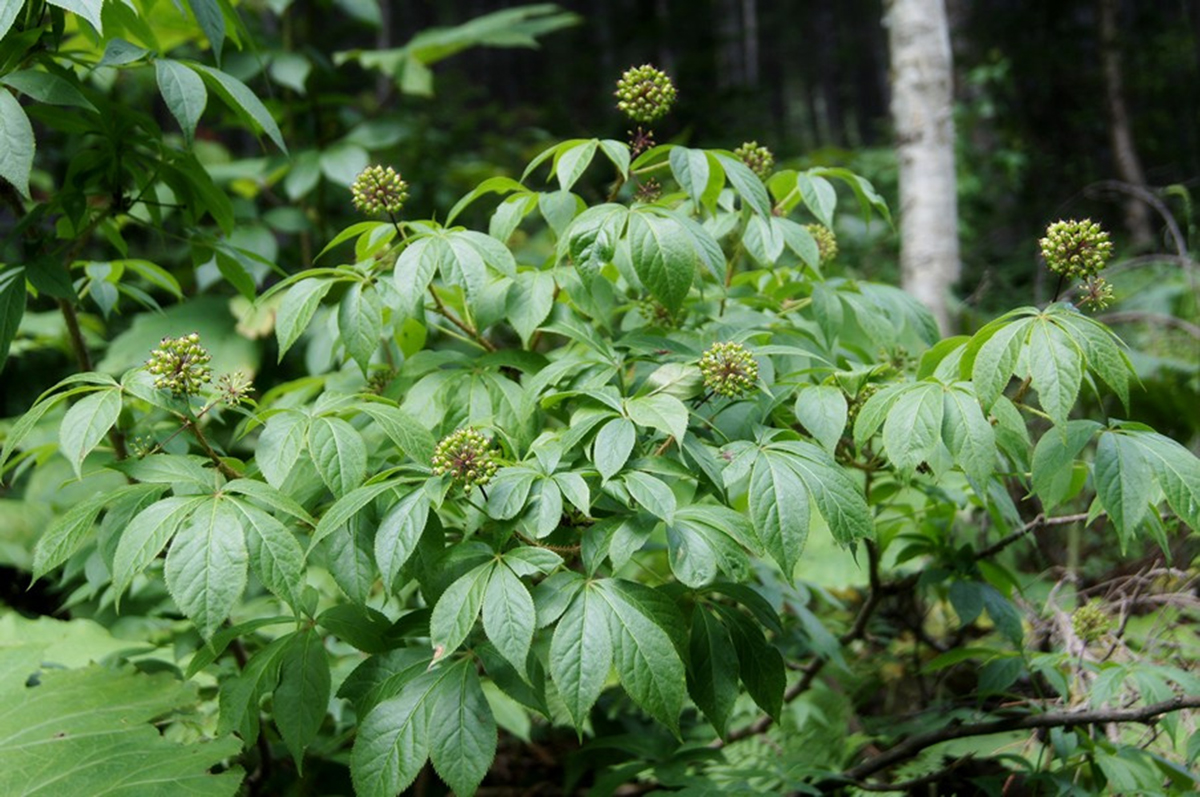Table of Contents
Siberian ginseng, or Eleutherococcus senticosus, later renamed Acanthopanax senticosus, is found under a variety of names, sometimes for silly reasons.
In the legislative frenzy after 9/1l, the American government banned the use of the term "Siberian" ginseng, in a patriotic gesture of protection to American Siberian ginseng farmers. (It also banned the use of the word "catfish" to describe imported catfish as part of a terrorism law.) In the United States, Siberian ginseng is typically known as "eleuthero" also in various countries it is also known as buisson du diable, chi wu cha, ciwujia, devil’s bush (because of its prickly thorns), devil’s shrub, eleuthero, ezoukogi, koljucij, gashi ohgap, hongmao-wujiapi, many-prickle acanthopanax, pai wu cha pi, prickly eleutherococcus, shigoka, Siberian ginseng, Stachelkraftwurz, Stachelpanax, taiga root, Taigawurzel, thorny ginseng, thorny Russian pepperbush, touch-me-not, tsu wu cha, wild pepper, wu cha sang, wu cha seng, and wu jia pi.

The best scientific evidence for the use of eleuthero is for fighting fatigue.
Clinical trials have found that this eleuthero extracts work in a number of non-specific ways to help the body adjust to fatigue, stress, and noxious chemicals. They help reduce both weight loss due to deprivation of food during stress, and weight gain due to overeating in response to stress.
Taking eleuthero on a regular basis helps the body fight bacterial infections. However, waiting to take eleuthero after you are sick is not a good idea.
Laboratory experiments with animals find that taking eleuthero on a regular basis stimulates a kind of white blood cell known as a macrophage, which patrols the body looking for infectious microbes, to travel more widely and respond to infections more vigorously. White blood cells release inflammatory chemicals to destroy microorganisms and then consume them, using them as part of their food supply. However, when laboratory animals were given eleuthero only after they showed symptoms of infection, they got temporarily worse.
It can be a good idea to start taking eleuthero when you know you are coming up on a stressful period.
Dr Brekhman ran clinical trials with a total 4,400 people in the Soviet Union in the 1960's. He found that giving eleuthero every day for 60 days reduced fatigue of factory workers, and seemed to have a special benefit for protecting hearing. Brekhman later tested the herb as a tonic for people who had coronary artery disease, high blood pressure, diabetes, chronic bronchitis, or rheumatic heart disease. He found that giving the medication lowered bad cholesterol and reduced clotting factors in the bloodstream. This makes heart attacks (or second heart attacks) less likely. The people in his second study also reported they felt better and found it easier to work.
See Also: 10 Herbs For The Heart
Eleuthero isn't for everyone.
There are a few people who need to take care not to overdo eleuthero, specifically, people who are in the early stages of male pattern baldness. Eleuthero causes the body to use testosterone more effectively. Several famous American basketball players who had hair, such as NBA great Charles Barkley, who reportedly drank 40 bottles a day, lost it when they started using eleuthero in excess.
- Panossian AG. Adaptogens in mental and behavioral disorders. Psychiatr Clin North Am. 2013 Mar. 36(1):49-64. doi: 10.1016/j.psc.2012.12.005. Review. PMID: 23538076.
- Takahashi Y, Tanaka M, Murai R, Kuribayashi K, Kobayashi D, Yanagihara N, Watanabe N. Prophylactic and therapeutic effects of Acanthopanax senticosus Harms extract on murine collagen-induced arthritis. Phytother Res. 2014 Oct
- 28(10). 1513-9. doi: 10.1002/ptr.5157. Epub 2014 May 2. PMID: 2479749.
- Mind map by SteadyHealth.com
- Photo courtesy of Tatters ❀ via Flickr: www.flickr.com/photos/tgerus/8654220985


Your thoughts on this